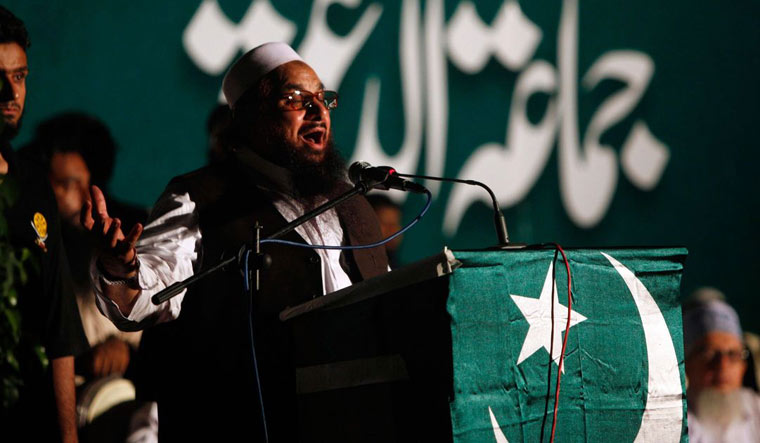Did Pakistan build a smokescreen when it submitted a report to the Asia/Pacific Group, a subgroup within the Financial Action Task Force (FATF), in 2017 to avoid being placed on a grey list?
Details of the report submitted by Pakistan show how Islamabad claimed to have taken a number of steps to clamp down on Lashkar-e-Taiba (LeT), Jamaat-ud-Dawah (JuD) and Falah Insaniat Foundation (FIF), which seem to have fallen flat since.
Islamabad is once again working overtime to clear its records ahead of the plenary meeting of FATF scheduled to be held at Paris from June 24 to 29. If all does not go well, the country will fall into the grey list category of the global watchdog for combating terror financing.
The FATF has different gradings for countries that come under its scanner. Once they fall in any category, 'automatically' financial institutions the world over take a step back as far as financial dealings with the marked country are concerned.
Not faced with a pleasant scenario, Islamabad is once again busy preparing a detailed action plan to submit to the APG, listing out the steps it has taken against money laundering and terror financing as set out in the FATF recommendations.
Government officials in New Delhi wonder why the steps listed by Islamabad in its previous reports have not achieved the desired result to keep its records clean in the last few years.
In June 2010, Pakistan agreed with FATF on an action plan to address the strategic deficiencies in the country's legal, operational and enforcement areas concerning criminalisation of money laundering and terrorist financing; functioning of Financial Intelligence Unit; freezing of terrorists' assets under UNSC Resolution 1267 and UNSC Resolution 1373; money remittance business and cross-border movement of currencies.
Pakistan completed the action plan in June 2014 and subsequently a team visited the country in December 2014 to confirm the status of implementation of the action plan. In February 2015, FATF removed Pakistan from the monitoring process on completion of the action plan, and encouraged Pakistan to continue working with FATF and APG, particularly with respect to residual concerns on three designated entities of concern—LeT, JuD and FIF.
At the FATF plenary of June 2015, a concern was raised that the residual issues had not been fully addressed. Subsequently, Pakistan gave a detailed report in January 2017 where it claimed it had put JuD and FIF in the Second Schedule (watch list) of the Anti Terrorism Act 1997 (ATA).
It said key terrorist leaders such as Hafiz Muhammad Saeed, Abdullah Ubaid, Malik Zafar Iqbal Shahbaz, Abdul Rehman Abid and Qazi Kashif Hussain were arrested on January 30, 2017 and placed on the Exit Control List.
Pakistan claimed that this was aimed at curtailing the operational space and fundraising activities of these organisations. It also said that arms licences of 38 individuals have been cancelled and their assets frozen. Pakistan claimed that a total of 69 bank accounts had been frozen till January 31, 2017, and they had even been prevented from using websites and other internet-based platforms for fundraising.
The Pakistan government said the State Bank of Pakistan had issued specific instructions to all banks to freeze accounts of listed individuals and entities or those having association with them. The Securities and Exchange Commission of Pakistan (SECP) similarly issued instructions and guidelines to companies under its ambit to implement the assets-freezing measures against listed individuals and entities.
Pakistan also told the APG that Pakistan Telecommunication Authority (PTA) has developed an e-portal system to launch complaints against the misuse of the internet for the purposes of terrorism and the financing of terrorism.
These steps were included in a comprehensive action-taken report by Pakistan, claiming that it remained committed to effectively implementing the UN sanctions and FATF guidelines.
When the FATF plenary meets again in June-end, all these measures will once again come under scrutiny, and all eyes will be on whether Pakistan is able to fulfil its own commitment in the fight against terrorism.


